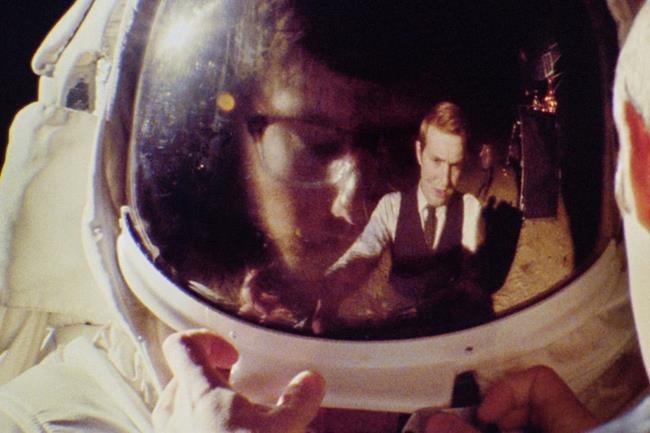
A scene from “Operation Avalanche” is shown in a handout photo. THE CANADIAN PRESS/ho-Canadian International Documentary Festival
April 26, 2016 - 10:16 AM
TORONTO - Fact and fiction will collide at Toronto's esteemed Hot Docs festival kicking off Thursday as several documentaries incorporate performance, story and script — including one that's totally fake.
Michal Marczak's "All These Sleepless Nights," "Love True" by Alma Har'el and the buzzy "Operation Avalanche" by Matt Johnson are among the films that push the definition of documentary and signal the rise of creative non-fiction in the genre, say those in the industry.
"We're seeing really interesting hybrids and experimentation happening in the documentary form," says Shane Smith, director of programming for the Hot Docs Canadian International Documentary Festival.
"You wouldn't think that documentary would be such a creative, malleable genre but it really is."
Smith notes construction and staging have been happening in documentary for decades, stemming as far back as 1922's "Nanook of the North."
But these days, filmmakers "are really elevating that and digging in to those creative elements of the documentary form."
"Documentary is mediated reality," says Smith. "The minute you put a camera down in front of somebody, it changes their behaviour, maybe just in very small ways but they're aware that a camera is there and that it's there for a specific purpose — there's a story to be told.
"So I think filmmakers being upfront about incorporating storytelling elements into their films does not do a disservice to the genre at all. I think it just enhances the power and the opportunities for documentary."
Billed as a fake documentary, "Operation Avalanche" follows two CIA agents in the 1960s as they infiltrate NASA to find a Russian spy and end up trying to fake a moon landing.
"I made a fake documentary because I think that form is actually quite vital at the moment," says Toronto-based Johnson, who also stars in the film and made the 2013 fake doc "The Dirties."
"I think questions about authenticity and the formal approach that most fiction filmmakers are taking are getting closer and closer and closer to documentary filmmaking and vice versa."
Other recent examples of homegrown fake docs include "No Men Beyond This Point" by Vancouver-based Mark Sawers, which came out on video on demand platforms and iTunes on Tuesday and will be sold on DVD on July 12.
The film takes a documentary approach to tell a story about a fictional world where men are becoming extinct and powerless.
Unlike a mockumentary, which is often a comical spoof with winking nods to the documentary genre and characters acknowledging the cameras, a fake documentary usually has all the conventions of a traditional one and doesn't present as a parody.
The fake doc "tries to trick people in a way," says Sawers.
"It's a different form of satire, to me anyway," he adds.
"I think satire is always useful in terms of making us look at our society through a different lens."
Johnson says the film that inspired his approach to fake docs was the 1992 Belgian Cannes hit "Man Bites Dog."
"These movies are not trying to make fun of any type of subculture and they're also not done tongue-in-cheek really," he says.
Johnson says the perks of making a fake doc as opposed to a narrative movie is that it's cheaper and it offers "free tools that other filmmakers just don't get because they need to follow the rules."
"We shot at NASA, actually at NASA, without them knowing that we were making a movie about faking the moon landing," he says. "That's the kind of thing that we could never have done if we went in with a script and said, 'We want to make a movie about faking the moon landing.'"
That raises the question of whether institutions like NASA might become reticent about letting other documentary filmmakers in to make films.
But Johnson feels that shouldn't "stand in the way of that progress of filmmakers' rights and letting people tell new stories."
"If I'm not doing it, somebody else is," he says. "So the world is going to change and I think it's actually a huge boon for people to be more media-savvy and think about how their images can be used.
"I don't make movies that make people look stupid. Nobody who appears in this movie I think can justifiably say, 'Oh, I look dumb,' or 'You made me look like a buffoon.' Not at all. We're actually trying to make people look as good as they can but tell a story that maybe they don't know that we're telling because if they knew, they couldn't be their authentic selves.
"So I don't take that criticism seriously."
The Hot Docs festival runs through May 8.
News from © The Canadian Press, 2016